Note: The following article contains major spoilers for Horizon: Zero Dawn.
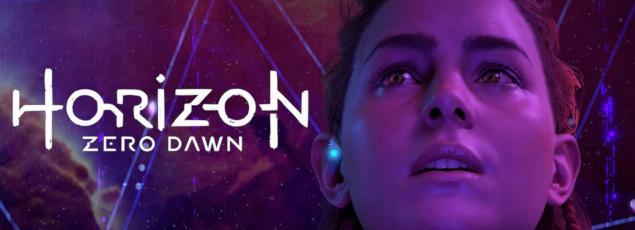
In 2015, representatives from every country on Earth gathered in Paris to agree on a strategy to prevent the planet's destruction. Following the advice of leading climate scientists, the nations pledged to limit global warming to 2°C above pre-industrial levels, with a further aim to keep it from exceeding 1.5°C. They did this on the understanding that failure would risk catastrophic ecological collapse. Five years later, three of the institutions tracking that progress came together to produce the State of Climate Action Report.
Published at the end of 2020, the document concludes that, in the majority of areas, the world is failing to hit the targets issued by the Paris Agreement. Even more worrying, when it comes to agricultural emissions and deforestation, the problems are getting worse, not better. Meanwhile, ocean pollution threatens a key link in the chain of life, with plastic waste in the ocean increasing rapidly. And as we speak, more than a quarter of life on Earth is directly threatened with extinction.
The message is clear: the current political strategies for preserving the Earth aren't working. Unless we better scrutinise states' and powerful organisations' environmental approaches, we will pay an unthinkable price. However, mainstream media and popular discussions on climate don't do much to error-check the prevailing thinking on this topic. Companies, reporters, and politicians often tell us that there are two positions on environmentalism: you're for it or against it. You either have a sense of moral duty towards our home, or you don't. This unsophisticated view of climate action doesn't equip us for a reality in which a lot of people claim to care about the environment but aren't pulling it out of this destructive slump. We need to know the nature of nature and what actions we should take regarding it.
Horizon: Zero Dawn is a 2017 sci-fi action-adventure from Guerilla Games. It takes place in a beautiful natural landscape where primitive human tribes live alongside animalistic machines. Robots appear in the form of deer, raptors, horses, and other creatures, all of which feed off of the land. Tribes hunt these automata and recycle the scrap from their bodies to fashion clothing, weapons, and other practical items. The machines originate from subterranean factories without any operators, and the communities don't believe these metal beasts are human creations. As they see it, the synthetic animals, like everything else, were created by a goddess their ancestors betrayed. For the first few hours of Horizon, it is unclear if or how this universe relates to our own.
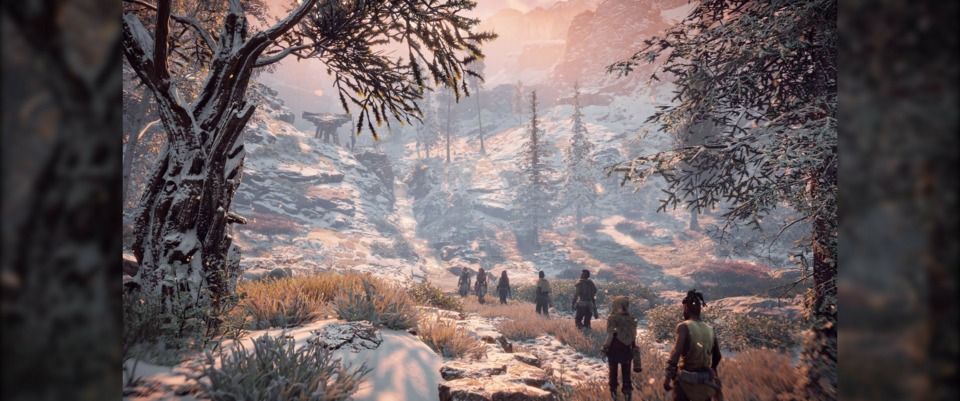
We explore these lands as Aloy, the surrogate daughter of Rost. Rost is an exile of the Nora, an isolationist mountain tribe. One day in her childhood, Aloy falls into a long-abandoned bunker where she finds a "Focus". A Focus is a device that projects a heads-up display onto the world, identifying lifeforms, marking tracks, and more. Aloy eventually earns entry to the Nora by competing in the coming-of-age trial they call The Proving. Tragically, during the ceremony, the Nora home of Mother's Heart comes under attack by outsiders. The Carja, a rival tribe to the Nora, had long ravaged their territory. However, a mysterious sect known as The Eclipse perpetrates this exceptionally bloody raid.
Rost dies in the attack, and Aloy is knocked unconscious. She wakes inside the mountain under the watchful eye of a tribe matriarch: Teersa. Teersa tells Aloy the story of her origin, explaining that no human birthed her. The matriarchs, instead, found her in front of a locked metal door in the mountain. When Aloy approaches the door again, a scanner recognises her as "Dr. Sobeck" but reports that it cannot open as data in its computer is corrupt. Teersa takes the scanner's recognition of Aloy as a sign. Against the protest of her fellow councilwomen, she appoints Aloy to the position of "Seeker". A Seeker is a Nora chosen one who, unlike other tribespeople, is allowed to venture beyond the borders of Mother's Heart. With no reference frame for data corruption, Teersa interprets the "corruption" in the mountain as something spiritual and hopes that Aloy will find and destroy its source.
Our protagonist journies to the Carja capital of Meridian where the culture is shifting. The city represents the most advanced technological achievements in Horizon's world. The Carja there have autonomous elevators, towering fortresses, and organised farming. In the past, the Carja waged bloody, imperialistic invasions on other societies, but they have since crowned a new king: Avad, who has a more merciful modus operandi. Slowly, peace between the tribes is returning, even if many of the old prejudices linger.
In the wilds, Aloy encounters both pure and "corrupted" machines. The corrupted corrode the land and attack anything living. With the help of a recluse called Sylens and the records left in ancient ruins, our protagonist discovers the history beneath the ground she stands on. In the 2040s, an up and coming tech entrepreneur, Ted Faro, hired a genius roboticist, Elisabet Sobeck. At Faro Automated Systems, Sobeck designed machines to repair an Earth braving climate collapse. She succeeded, and Faro became the richest man in existence. The CEO then pivoted his corporation from the environmental sector to the military-industrial, selling his robotic arsenal to anyone who would buy. Disgusted, Sobeck left to continue her work at her own firm: Miriam Technologies. While Miriam was also regarded as successful in the ecological cleanup, Faro buried the company in lawsuits to retain his monopoly.
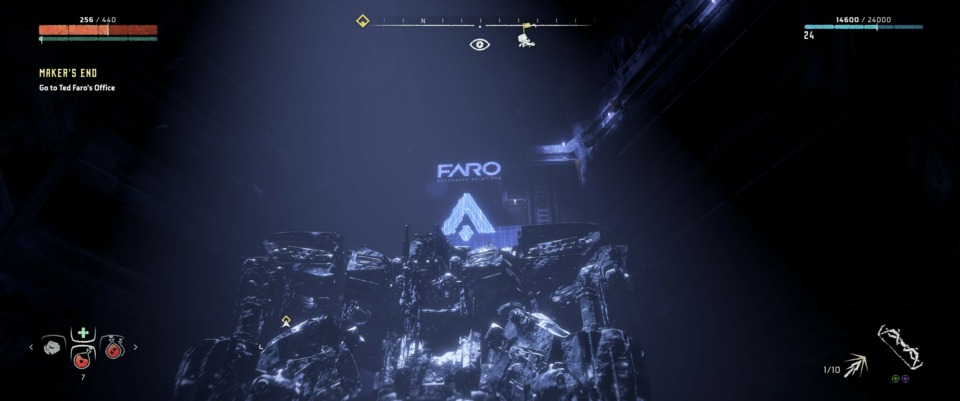
In 2064, Ted's luck finally ran out. His war machines were capable of powering themselves by feeding off of biomass. However, his people lost control over them, and they became free agents, bent on consuming all life on Earth to fuel themselves. In desperation, Faro contacted Sobeck, who confirmed that there was no way of stopping the living weapons' wave of destruction. In a last-ditch effort to preserve the Earth, Faro funded what he called Project Zero Dawn.
While organic life could not survive the consumption, AI could. So, Zero Dawn recruited top academics from around the world and had them develop an organising, electronic intelligence capable of rejuvenating the planet. This computerised mind would kick into gear long after the machines starved off from lack of power. To save the world, they had to birth God. The AI they built to manage Zero Dawn was GAIA, a consciousness that would reboot our ecosystem, using, among other solutions, robots that could take the place of animals. GAIA would also be responsible for a battery of human clones that could repopulate the Earth. Those clones would learn from a database left behind by Zero Dawn's experts. Lastly, a sub-mind of GAIA, HADES, would be capable of stripping all land bare once again, should the initial rewilding attempt fail and have to be repeated. HADES was to remain offline unless such an incident occurred.
The experts at Zero Dawn constructed GAIA and the database without a hitch. Yet, the project ran awry when Faro concluded that replicating humanity's knowledge into the future would only cause the next generation to make the same mistakes. He, therefore, purged the memory banks and murdered Zero Dawn's architects. While human clones did re-enter a thriving natural world, without a knowledge base to carry into it, our species had to restart its technological and intellectual development from scratch. Humanity's past became its future.
There was no further existential threat to the planet until 3020, when someone or something was able to wrench GAIA's various sub-minds away from each other, making them independent intelligences in their own right. One of those intelligences was HADES, who got to its job of wiping the Earth of everything living. It understood that to achieve this goal, it had to destroy Earth's protector, GAIA, and it succeeded at that task. GAIA used her dying breath to generate a copy of Dr. Sobeck at a Zero Dawn cloning facility. That clone was Aloy. GAIA knew that, sharing Sobeck's DNA, Aloy would be able to bypass HADES' genetically-based security and issue a shutdown command.
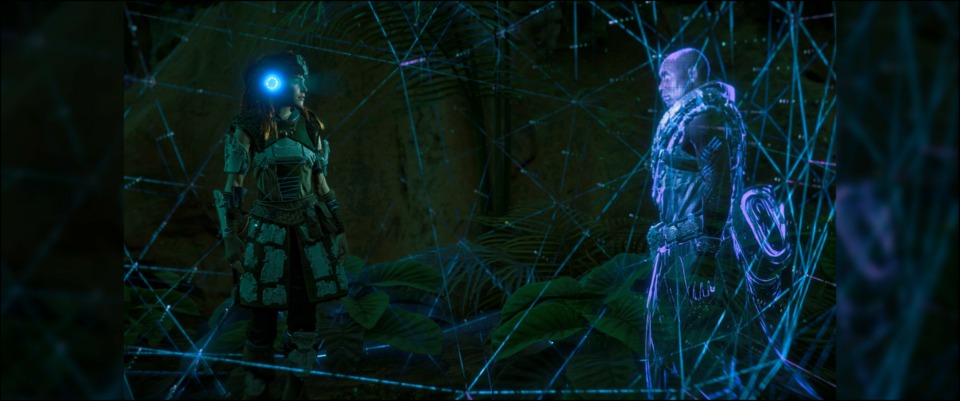
Around the time Aloy was growing up, the hermit, Sylens, found and repaired a Focus which led him on a quest of discovery. He encountered HADES, who, now a wreck, needed humans to do its heavy lifting. When Avad became king of the Carja, some tribe members defected, alienated by his vision of a peaceful future. Sylens tricked a band of the separatist Carja into believing that HADES was the "metal devil" of their religion who they could serve for great reward. In reality, Sylens had signed a deal with the same devil, believing he could weaponise the AI and use it to conquer the surrounding lands. Sylens' cult was The Eclipse. It's The Eclipse who have been "corrupting" the machines, bringing them under HADES' control.
After fully accepting the threat that HADES posed, Sylens went back on his plan. He contacted and recruited Aloy because he understood that, as the descendent of Sobeck, only she could slay the monster he'd resurrected. HADES too understood that Aloy was Sobeck's copy and instructed The Eclipse to kill her at The Proving, hoping to prevent its deactivation. Long story short, Aloy leads an army against The Eclipse and shuts HADES down.
One of the popular schools of thought that Horizon: Zero Dawn critiques is the idea that environmentalism is a matter of getting closer to what we've traditionally perceived as nature. The crux of this ideology is that we live in a modern and highly synthetic world in which we've become alienated from the organic environment that sustains us. That synthetic world may include anything from buildings to pharmaceuticals to computers. The idea is that by encroaching on the natural with our unnatural, contemporary creations, and absorbing those creations into ourselves, we're causing untold damage to the environment and our bodies.
Different people have different ideas on how exactly to fix this glitch, but uncontroversial solutions include buying green products, eating organically, and spending more time in the natural world. There's a general feeling that the right thing to do is ensure less of our planet is made of the products of factories and laboratories and that more of it is verdant fields and babbling brooks. It's an idealisation of the romantic view of nature.
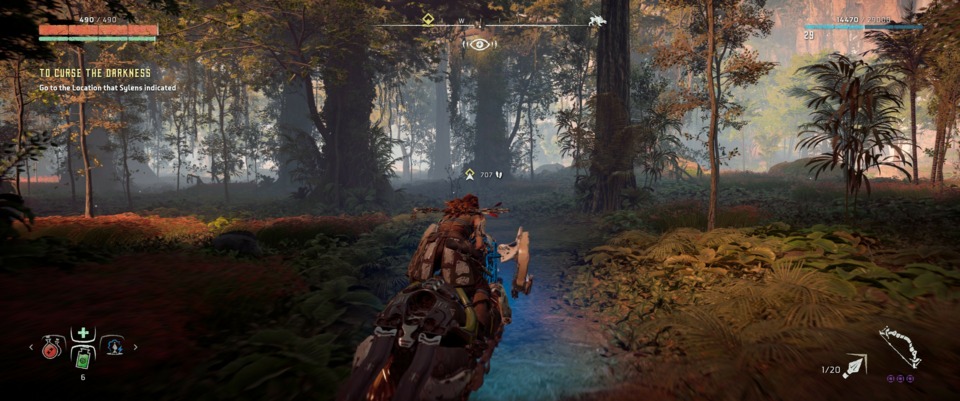
There's even a somewhat popular belief that hunter-gatherers and tribal humans had a more enlightened and pure connection to nature and that we should follow in their footsteps. It's a suspicion that we don't need to know anything scientifically about climate or biology to live in harmony with the planet. We simply need to "reconnect". Under this thinking, nature has a spiritual richness which we can't find in the humanmade. We should therefore treat the natural world with a near or literally religious reverence and outlook. At the most extreme end, the aversion to modern society and its products results in positions like anti-vax or anarcho-primitivism: the belief that we should dismantle civilisation and revert to primal living.
Being a little simplistic about it, we can say that Horizon: Zero Dawn rejects the notion that a healthy planet would not be abundant with machinery or deeply incorporate human intervention. In fact, in this universe, there is no sustaining life on Earth without scientific and mechanistic programmes so penetrating that they touch every corner of the ecosystem. In Project Zero Dawn, we see computing as essential for managing data and communications on the climate crisis and preserving knowledge for the future. We see cloning and cryogenics as tools to propagate and save our species. We see robotics used to fill in gaps in the tree of life. Imagine if the humans in Zero Dawn hadn't used these methods; Earth would be in tatters. Now imagine what will happen if we don't use them.
Our immediate artificial solutions to climate change don't look like stasis pods or autonomous plant harvesters. Still, in the realm of climate science, it's helped to think as far into the future as possible. A key concept in Horizon is that we can't necessarily know which tech or techniques will be the most useful in the future. However, we can empower coming thinkers to find the right solutions to the environmental challenges of their day. This is why the Zero Dawn engineers give GAIA the power to choose the heading of the planet instead of commanding it which robots to build and what decisions to make. And even if we won't be growing our clones in tubes any time soon, we have our own green machinery: Wind turbines, electric cars, nuclear plants, and so on. Zero Dawn takes that image of the Elysian fields that so many nature essentialists believe we should strive for and draws a few robot crocodiles on them. Maybe we'd draw a carbon capture plant or some GMO crops.
And on the flip side, Zero Dawn also doesn't see primitive living through a rose-coloured lens. The game actually has a lot of time for the idea that if we were to revert to the living conditions of our ancestors, there would be a lot of happiness to be found. We find solidarity within the societies of Zero Dawn that is uncommon in our time, and we see humans who feel tranquil and awestruck by resting in the bosom of nature. However, it takes a critical gaze towards fetishism of early human living in how difficult Rost and Aloy's life together is and in the Carja's Red Raids. The game notes that tribal living can lead to tribalism; a blessing if you're in a thriving society, not so much if you're on the outside.

Neither I, nor Zero Dawn, are trying to argue that all human tribes are savage and bloodthirsty in a way that non-tribal humans aren't. Both the real historical record and the societies we see in this game include communities that never attacked outsiders. And the widest-scale violence in history has been perpetrated by the people who call themselves the most civilised. In Zero Dawn, that means Faro arming soldiers the world over and eventually causing a mass extinction event. Polluters, empires, and private military companies are guilty of something not all that different in the real world.
But Horizon also refuses a patronising, one-dimensional view of tribal and early humans that says that none of them could hurt a fly. It feels appropriate for our own history in which Native American tribes did war with each other but were also the victims of a colonialist genocide which far surpassed that violence. The game could go further with this. For example, asking what a person who needs life-saving medication does in a world bereft of pharmaceuticals or what child mortality rates might look like in a hunter-gatherer society. Still, it has no delusion that humans without modern conveniences don't endure a lot of hardships.
As a person with not much more than a bow and a spear to survive by, we also experience the peril inherent in natural living. To respectfully co-exist with nature does not always mean cooperating with it peacefully. Hunting animals is something these tribes need to do to live. As Aloy, we can't sustain ourselves if we don't slaughter creatures and make them into armour, tinctures, and other helpful items. Similarly, hunting them is dangerous work, and through the combat system, Horizon emphasises that grappling with them can be terrifying and dangerous. In comparison to other action-adventures, Zero Dawn gives us a short health bar, meaning we often encounter situations in which the machines risk killing Aloy. The game also highlights the hazard posed by larger robots by having them knock our protagonist off her feet.
However, to say that Horizon believes we desperately need to incorporate machines into our environmentalism or that living close to the Earth can come with terrible costs is still not fully grasping the point. Because this idea that we need to depart from the synthetic to embrace the living implies that these are two distinct categories, and Zero Dawn does everything it can to show how those classes can be confused. If you believe that machines and life are distinct, then how do you fit the animal robots of Zero Dawn into your head? You can't. Dr. Sobeck makes this point to Ted Faro. When he says that it's going too far to refer to his newly autonomous products as "living", Sobeck observes that they're self-replicating and consume biomass, meeting a definition of life.
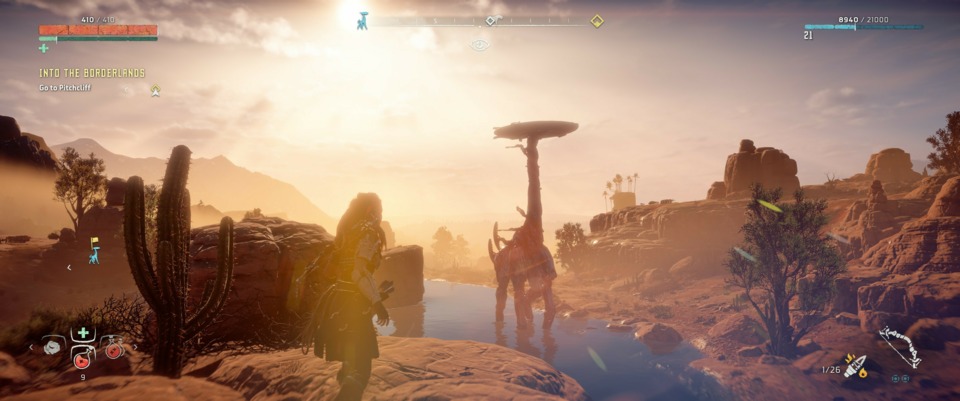
There are other definitions of life, including the entity in question being able to evolve, respond to their environment, or have self-sustaining internal processes, but GAIA's machines would meet all those criteria. By some definitions, these robots would not qualify as living; they are not, for example, composed of discrete cells and do not seem to grow. However, GAIA's handiwork at least begins to blur the line between machine and animal, and at most is not a barrier to us calling them organic.
The tribes of Horizon do not place a line between the robots and other animals: Rost describes "Beasts of air, water, earth, and steel". This line emphasises that, yes, we can note that the Watcher or Crawler robots exist in a different category of entities than, say, a badger or a giraffe, but then look at the gulf between a bird and a fish. We still label both as animals. The humans of Zero Dawn also destabilise this dichotomy. The Nora, Carja, and every other group on Earth descended from clones, and we even see those clones in some holograms. They are synthetic organics. And this is why Horizon: Zero Dawn discards the idea that we must reject the synthetic and embrace the natural. Because of a lack of a meaningful gap between the organic and synthetic, you can find all the positive traits traditionally associated with the natural and all the negative traits traditionally associated with the synthetic washing between both categories.
As we cannot entirely embrace the natural or reject the artificial in our mission to preserve the planet, and may struggle to separate these groups, it does not make sense to support only the organic while turning our nose up at the created. We've talked about how this idea manifests through the outlook and genetics of Horizon's tribespeople, but it's also there in the game's mechanics and the characters' fashions.
As Aloy, we're capable of killing both traditional animals and robots through the same combat system, looting and storing their products through the same inventory system, and combining them into similar items through the same crafting systems. There is no functional difference between taking a rabbit's meat and chopping it into a Health Potion, and extracting some accelerant from a stormbird and fashioning it into a Blast Trap. And they're both constructive means to work towards our ultimate goal in the game, which is saving the world. There are even valuable items that we must meld from mechanical and traditional organic parts. For example, the initial upgrades to all our satchels require combining metal shards and ridge-wood. So, the rules and interface suggest symmetry between rabbits and stormbirds, meat and accelerants, steel and wood.
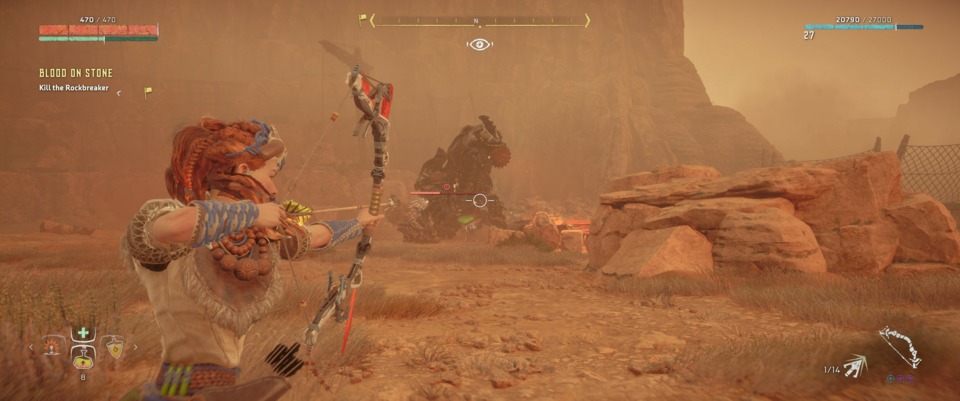
In our time, there is no AI-driven poultry to harvest. Still, we can apply Horizon's principle in our world. We can say that collecting and implementing synthetic products can be part of a healthy relationship with the environment. In this game, processed metal, circuits, manufactured chemicals, and plastic polymers can all play a role in environmentalism. They can even be interwoven with the aesthetics of individuals who care about that environment.
The tribespeople of Horizon wear headpieces and wield spears that place feathers and leather alongside scrap alloys and rubber cables. The juxtaposition of these materials doesn't just suggest compatibility; it also forces us to consider what materials we think of as organic and what we think of as synthetic. While we often perceive leather and feathers as natural, and metal and rubber as unnatural, this clothing and weaponry is all humanmade. Are the Nora or Carja, with their combinations of manufactured and non-manufactured clothes, homes, and tools living an agrarian or modernised life? Our existing understanding of these concepts can't really account for them.
Horizon does, unfortunately, harbour the same environmental contradiction as many AAA games. On the one hand, we are the protector of nature, sabotaging the forces that would harm it. On the other, we plunder all of its resources without any direct concern for conservation. Because Horizon has a limitless supply of animals, trees, and flowers, we can approach its landscapes with the same greedy acquisitiveness of the pre-fall corporations but without the same deleterious results. Zero Dawn even encourages harvesting and hoarding items you have no use for. To craft and trade for the top tier outfits, weapons, and upgrades, you need to expend rare resources, but you often can't see what components you'll need for future items. Therefore, the optimal strategy becomes turning yourself into a human dragnet, pulling in anything and everything you can from your surroundings, not knowing which resources will be vital and which are surplus.
We also cannot ignore that Horizon doesn't let us employ synthetic items that damage the environment. It makes sense within the context of the world: the tribes have no complex manufacturing capabilities, and GAIA wouldn't design machines with any materials that would be hazardous to life. However, it is important to remember that as Horizon's world is without pollutants or rubbish or anthropogenic greenhouse gases, we can't be as unattentive in our real-life consumption and production of certain materials as we can in the game.
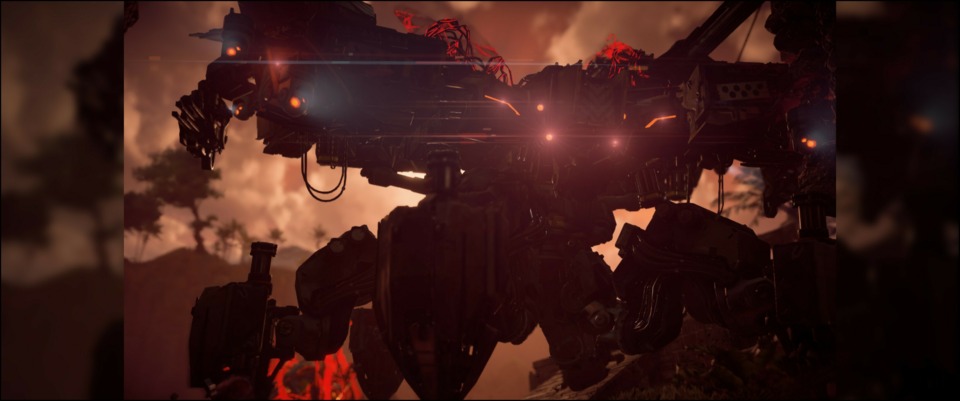
This isn't to say that Horizon doesn't have some concept of existentially threatening technologies, however. This universe has constructive and destructive tech; it just doesn't see those categories as synonymous with the organic and the artificial. Where we might look at Horizon's universe and reflexively separate it into the natural and mechanised, its denizens divide it into the natural and corrupted. So, what makes a creature "corrupted"? It is its relation to The Eclipse, which we can further connect to Faro Automated Systems. While we might see a pseudo-ancient cult like The Eclipse and a globe-spanning corporation like FAS as lacking many similarities, there is a key idea that binds them together: Faro and the invaders share the drive to dominate everything around them. In reawakening HADES, The Eclipse is rejuvenating the old conflict ideology of the pre-fall corporation. What corrupts nature is not the synthetic but the drive for power over others.
This is where Horizon's disagreement with finding a corporate inroad to environmentalism comes in. In our world, trying to find a capitalist fix for our eco-crisis isn't going well. Not only could I restate the points at the top of this article, but we can also tie the issue more closely to companies. The firms who are leading the charge on green capitalism are largely those who've spent their time polluting the planet up to this point. Off the bat, they seem like the last people you'd want in charge. Still, it's necessary to not just look at who they are but also what they're doing. Companies like Nestlé, Coca Cola, and PepsiCo talk a big game about their recycling programmes, but they're among the worst plastic polluters in the world. And recycling schemes are often a lot less humane and helpful than they sound.
For a long time, a significant portion of western recycling has involved exporting trash to the global south or Asia, often to countries incapable of properly processing the material. That detritus has frequently included toxic and hazardous waste, and sending it overseas has its own carbon cost. The west once dumped that trash in China, where it dirtied the air and waterways, spreading severe health defects and cancers until China stopped imports in 2018. Now, we'resaddling poorer South-East Asian countries with it, countries that have less capacity to process trash than China did. When it comes to companies cleaning up the ocean, the big polluters are mysteriouslyabsent. As for organic farming, it doesn't inherently produce food that's any better for you, while synthetic GMO farming can. And with current technologies, organic farming is worse for the environment than non-organic, partly because genetically modifying organisms can make them more efficient to grow or raise.
However, from everything I've read over the past few years, the biggest buzz in the green corporate sector is in reducing emissions. In recent times, airlines such as BA, United, and EasyJet, and fossil fuel providers, such as Shell, BP, and Exxon, have been visible pillars in the movement towards net-zero carbon emissions. So, you might think that you're supporting people who are pumping fewer dangerous substances into the environment when you're buying from these companies. In reality, what they're usually doing is "offsetting" their carbon output by effectively paying someone else not to release CO2 or to plant trees to absorb carbon from the atmosphere.

That might not be such an awful approach if it weren't for the fact that 71% of emissions come from 100 companies, including many of the above. So, for the majority of the problem to be fixed, these megacorps can't keep passing the buck. They have to change how much carbon they emit, and even a very environmentally friendly smaller company has minimal power over the amount of pollution in the air. Reducing CO2 emissions also isn't the same as reducing the release of other greenhouse gases like methane, nitrous oxide, or F-gases.
But what's particularly damning is how dubious these claims of carbon offsetting are and how cruel the side-effects can be on the vulnerable. In some cases, clearing land in Africa or South America to grow carbon-capturing forests has meant displacing people from their homes. And while we need action in the immediate, trees take time to grow. Once you do get a tree rooted, in the wrong conditions (the kind of conditions killing these trees in the first place), it can die off, releasing its carbon back into the atmosphere.
In the case that carbon offsetting involves protecting a forested area, there's basically no way to prove that you've done that. This act consists of predicting the future, which is never entirely possible, and there are all sorts of ways to game that prediction. You can cherry-pick data or model data using software that specifically says not to use it for this purpose or just claim to be protecting land that's already protected. All of which major companies are doing. These faulty carbon offset calculations misinform the public and allow these organisations to circumvent emissions laws. Fossil fuel providers were able to wipe at least 39 million tonnes of CO2 from the books of California via fake carbon offset.
Now, these firms do claim they protect the environment by investing in green energy solutions, but that investment often pales in comparison to how much of their money is tied up in dirty power. Much was made of the $300m fund for natural causes Shell launched in 2019. Yet, the previous year, it had spent more than 83 times that on fossil fuels. BP was legally challenged for branding itself as a green energy trailblazer, even while keeping 96% of its energy spending in fossil fuels. And all the while, these titans of industry are lobbying to water down climate protections. Over two decades, US climate lobbyists slid politicians more than $2 billion in an effort to halt environmental protections. A senior lobbyist for ExxonMobil even admitted to the company secretly using third-party shadow groups to push back against climate regulations.
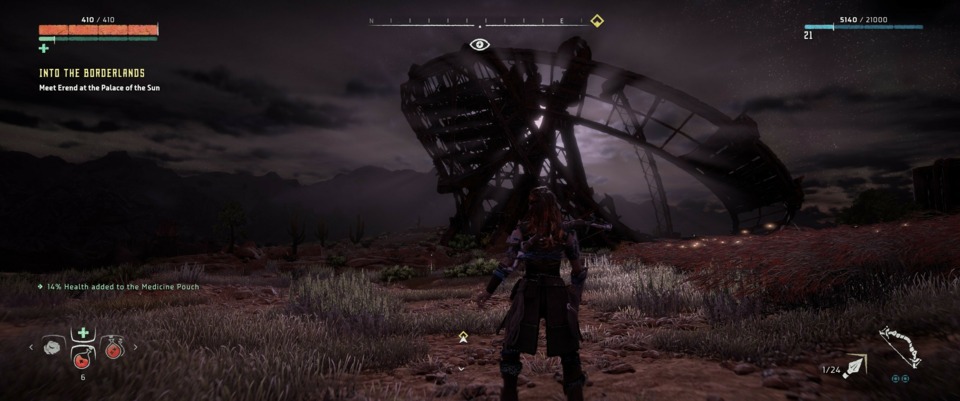
Horizon's backstory reflects this failure of big business interests to mend our ailing planet and the factional conflict that green capitalism creates. But it goes beyond saying that these corporations haven't saved people to state that we should not give them the kind of agency that would allow them to. In this story, a Biblically powerful firm does clean up the Earth, and it's still not enough to prevent the apocalypse. Faro and his investors yank the ecosystem back from the brink of armageddon, but they're ultimately just following the profit motive. When it becomes more lucrative to end lives rather than start them, Ted and co. turnabout and begin working towards the planet's demise, and they can do that because of all the capital they amassed revitalising our world. What would stop any real corporation from doing the same? Profit eats the Earth.
Faro Automated Systems end up in this absurd contradiction where their technologies work both towards and against the preservation of life on Earth. The company is responsible for the Faro Plague and Project Zero Dawn. The inherent contradiction of FAS's politics is represented in it arming warring factions, supplying weapons to both sides. It's a position that mirrors the paradox we're currently presented with, where many of the companies poisoning the environment are the ones telling us they're saving it. It's worth noting that in all of this, the rival "good" company, Miriam Industries, also isn't able to avert Faro's planetary destruction. The bigger companies will always do what is necessary to protect their profits, including forcing greener competition out of the market. Even letting the tech entrepreneur implement the last-ditch emergency button for humanity doesn't work. Faro's control over the project allows him to unanimously destroy much of the experts' work and kill every one of them.
Just as we can unite the philosophies of Faro and The Eclipse, we can also connect the CEO's beliefs to the Nora. They both believe in strength through ignorance. The people of Horizon's world are apathetic or opposed to researching history or challenging their beliefs and are distrustful of exploring the unknown. Rost disapproves of Aloy wearing the Focus, and tribespeople tell her that she shouldn't spelunk below the Earth because that's where demons live. As covered, the Nora are scared of anything outside of their comfort zone, so they don't venture beyond the borders of Mother's Heart. Aloy almost doesn't become the Seeker because most of the matriarchs distrust someone not born from human beings.
Ted Faro also wants to erect a wall between the people of the new world and the knowledge of the old world. He kills every Project Zero Dawn member and purges GAIA's databases. There's a concept in computing called security through obscurity; the idea is that you can prevent your systems from being breached by keeping the knowledge of their weaknesses from getting out. Experts across the board say that using obscurity as the primary or sole defence against attackers does not work. The reason being that there are so many industrious hackers working away at cracking networks and machines that there's always a chance someone will figure out your system's flaw on their own. Therefore, the only decent way to defend computers is to search for exploits, find fixes, and educate engineers on both.
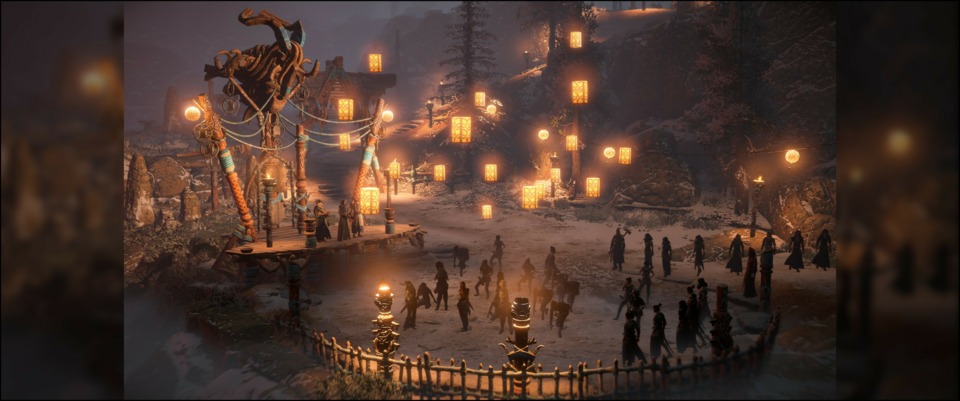
Both Faro and the sheltered tribes of Zero Dawn are reliant on security through obscurity: a belief in forbidden knowledge and forbidding knowledge. But bleaching out the teachings of the old work doesn't work; bad actors that Faro and the Nora have no control over dredge those lessons back up. The Eclipse weaponises that ancient comprehension of technology and dominance against their enemies. When they do, their victims lack knowledge of their methods of attack, and so, can't defend themselves. We sometimes find in our societies the view that spiritualism and science are two incomparable lenses through which to view the same phenomena, neither more valid than the other. Horizon: Zero Dawn disagrees. It shows the people who interpret machinery, chemicals, and electronics religiously as full human beings with a rich culture. However, it also displays that it is only through understanding the physical and technical basis of these entities that someone can harness them.
Zero Dawn demonstrates that to understand the web of Focuses as a computer network is to understand them better than someone who views them as telepathy. Someone who views the corruption signal as a computerised communication "gets it" to a greater extent than someone who believes it is a wave of evil. The proof of this superior knowledge in Horizon is that it's as people approach a scientific understanding of the technologies that they become able to manipulate them, either altruistically or selfishly. And if you are someone who wants to act constructively with respect to the environment, then you have to stand as a bulwark against those who act destructively. That's only possible with an accurate grasp of the technologies in play.
Horizon: Zero Dawn satirises a hole in the logic of anarcho-primitivism. Even if humans did manage to deconstruct the trappings of civilisation and start up a new life ignorant of bygone ways, that doesn't stop anyone outside your society from using the tools of civilisation for exploitation and war. At that point, your only recourse would be to use your own knowledge and engineering capacity against them, which you will have very little of if you've reduced your society to a primitive state. Trying to suppress the information does not secure you. In Horizon, it is only through learning about the nature of HADES and the corruption, and devising hacks with which to counteract it, that Silens and Aloy stop the second extinction. Even the Eclipse, the antagonists, aren't safe from ignorance. Their lack of understanding of HADES means they're at risk of being wiped out by a mysterious god.
Aloy is, in some sense, a chosen one, and like many other action game protagonists is nimble, resilient, and physically fit. What distinguishes her, especially within her own fiction, is that she doesn't fetishise anything. She doesn't think of nature as this untouchable, godly force, which means that she will meddle in it. When Teersa bows before the hologram of Sobeck, Aloy steps right up to it. When the Nora try to worship Aloy for saving them, she rejects it, telling them to treat her like just another person.
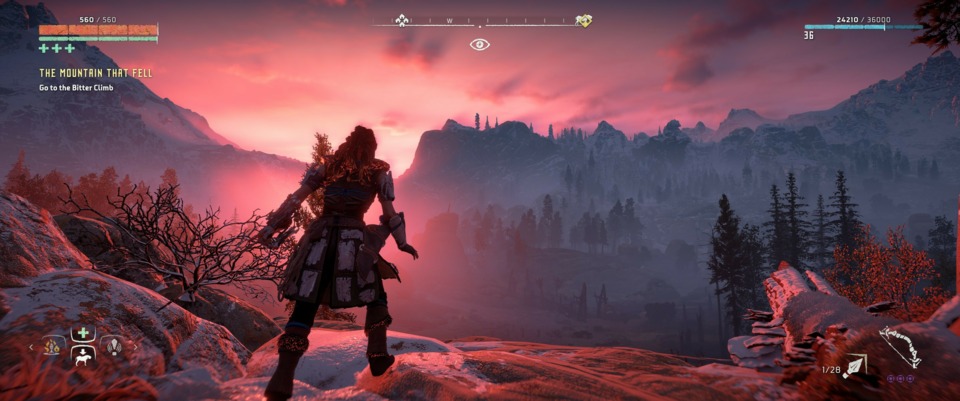
Let's wrap up.
From Zero Dawn's perspective, it's not just that appeals to nature in the name of ecology are wrong but that they're incoherent. Arguing that you want to sustain the planet without the synthetic is like arguing that you want bread but don't want any baking. We're not going to get one without the other. Respect for the Earth without the knowledge or technology to save it is not enough; look at the Nora. But understanding and power without a fundamental care for the environment is ruinous; see Faro. The protagonist of Horizon exists as an aspirational figure because she is an alloy of these two schools of thought. She has consideration for the environment without so much reverence that she won't touch it, and she uses technology to help the ecosystem without aiding anyone who has a fundamental profit motive. We can, and must, do the same if we're to survive. Thanks for reading.
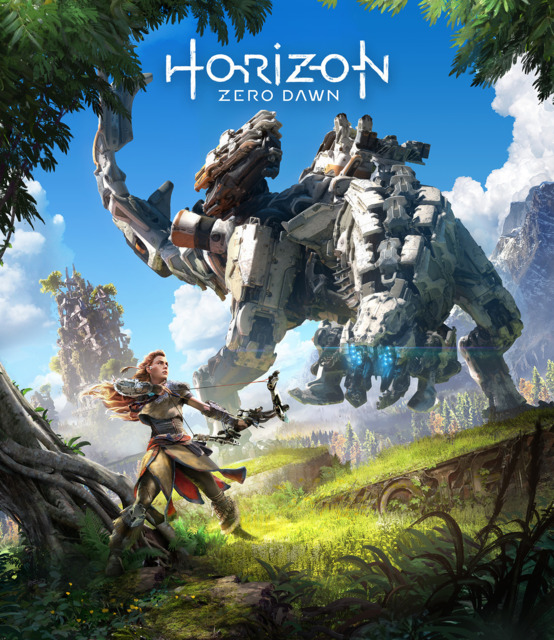
Log in to comment